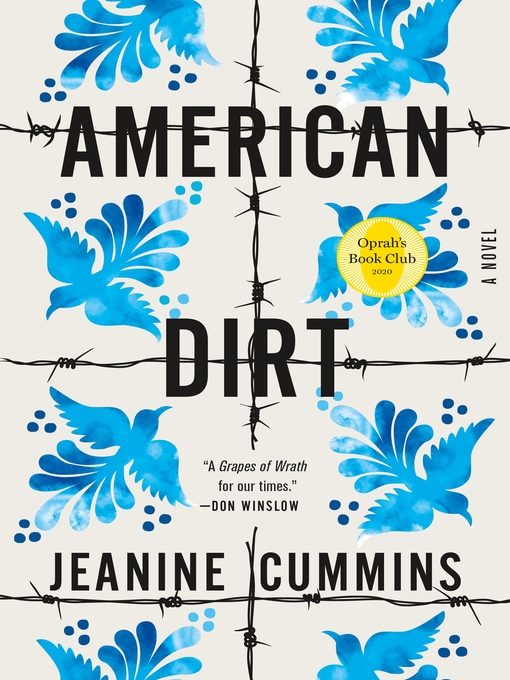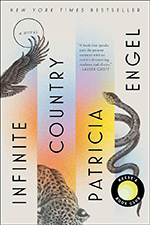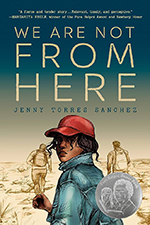
American Dirt
by Jeanine Cummins
GENRE: Contemporary Fiction, Literary Fiction
Bookstore owner Lydia Perez and her family had been living a comfortable life in Mexico until Lydia’s family members are murdered by a cartel. Forced to leave Mexico, Lydia and her son Luca must cross the U.S. border to safety, along with other migrants they meet on the way. This harrowing journey is told in the alternating points of view of Lydia and Luca as they face a myriad of obstacles, and yet maintain their optimism for a better tomorrow.

Jeanine Cummins was born on a US Naval Base in Rota, Spain, and spent most of her childhood in Gaithersburg, Maryland. When she was sixteen, Jeanine’s family experienced a horrific violent crime: the double-homicide of her two cousins by four strangers. Her brother was the only surviving victim of the attack. The crime and the impact it had on her family became the subject of her best-selling 2004 memoir A Rip in Heaven.
After that publication, Jeanine began speaking publicly about victims’ rights, and specifically about her family’s experiences with the criminal justice system. Jeanine is a death penalty opponent and can speak to the ways death row further persecutes victims of violent crime. She has addressed college, high school, and middle school students about topics from writing to victimology, to turning trauma into art. She’s spoken to first responders about best practices when dealing with victims of violent crime and trauma. She has also visited prisons where she spoke with inmates about using art or stories as a way to take ownership over trauma.
With her new book, American Dirt, Jeanine looks forward to the opportunity to discuss her extensive research into the origin stories of migrants and refugees who attempt to get to the US via the southern border with Mexico. During her research, Jeanine visited migrant shelters and orphanages in Mexico, met with humanitarian aid workers who provide water to migrants in the desert, interviewed lawyers who provide pro bono legal services for unaccompanied minors, and volunteered at a desayunador (soup kitchen) in Tijuana. Those experiences, among many others, were deeply influential in helping Jeanine understand why Mexican and Central American migrants are willing to undertake such a perilous journey, crossing Mexico atop the treacherous freight trains known as La Bestia, all in the hopes of reaching a hostile and closed foreign border. - Macmillan Speakers
Booklist
Lydia Perez's life is not extraordinary; she is a bookstore owner with a husband and eight-year-old son, Luca, in Acapulco. When cartel jefe Javier Fuentes has her entire extended family killed while Lydia and Luca are fortuitously hiding in a bathroom, Lydia realizes they must leave Mexico immediately or be killed when Javier finds out she is still alive. Luca, confused but trusting in his mother, embarks with her on an odyssey to the north, joining other migrants trying to make it to the U.S. border. What they see along the way will bring readers both heartbreak and hope, pain and promise. While Cummins alternates points of view, Luca's voice in particular sings with innocent optimism in the face of a series of near misses. The journey towards the prospect of safety is not only that of Luca and Lydia but of many other migrants, and complex secondary characters serve as both warnings and signs of possibility. Beautiful, straightforward language drives home the point that migration to safer places is not a political issue but a human one. HIGH-DEMAND BACKSTORY: With a story line sure to be much discussed this election year plus a film in the works American Dirt may be the don't-miss book of 2020.--Tracy Babiasz (Reviewed 11/01/2019)
Publisher's Weekly
With this devastating yet hopeful work, Cummins (The Crooked Branch) breathes life into the statistics of the thousands fleeing their homelands and seeking to cross the southern border of the United States. By mere chance, Lydia Quixano Pérez and her eight-year-old son, Luca, survive the massacre of the rest of her family at her niece's quinceañera by sicarios of the Los Jardineros cartel in Acapulco. Compounding the horror of the violence and loss is the fact that the cartel's leader is a man that Lydia unwittingly befriended in her bookstore. Lydia and Luca flee north to the only refuge that she can imagine: her uncle's family in Denver. North of Mexico City, all other sources of transportation become impossible, so mother and son must risk traveling atop La Bestia, the freight trains that are the only way to reach the border without being seen. They befriend two beautiful sisters--Soledad, 15, who is "a living miracle of splendor," and Rebeca, 14--who have fled life-threatening circumstances in Honduras. As the quartet travel, they face terror on a constant basis, with danger possible from any encounter, but also compassion and occasionally even wonder. This extraordinary novel about unbreakable determination will move the reader to the core. (Jan.)
Library Journal
In a book both timely and prodigiously readable, Cummins (The Crooked Branch) offers an unrelenting and terrifyingly you-are-there account of a Mexican mother and son fleeing to America after cartel violence takes their entire family. Lydia had been comfortably running a bookstore in Acapulco, but cartel violence is escalating, and the charming customer with whom she's become friendly turns out to be the jefe of the newest, cruelest cartel in town. When he's also the subject of her journalist husband's latest reveal-all profile, vengeance is swift, which puts Lydia and Luca on the run by bus and van, in migrant shelters, on top of a train, and, finally, in the remote and blazing American Southwest. Cummins expertly balances the brutality of the cartel, its scary omniscience, and Lydia's ululating fear with Lydia's passionate commitment to Luca's survival and the numerous small, brave acts of kindness she encounters that speed this duo north. VERDICT Here, it's the journey rather than the arrival on American dirt that counts, and readers will wonder whether they could ever have survived such a trek even as they realize that this could happen to them. An important book. [See Prepub Alert, 7/15/19.]--Barbara Hoffert.
Kirkus Reviews
This terrifying and tender novel is a blunt answer to the question of why immigrants from Latin America cross the U.S. border and a testimony to the courage it takes to do it. Cummins (The Crooked Branch, 2013, etc.) opens this propulsive novel with a massacre. In a pleasant Acapulco neighborhood, gunmen slaughter 16 people at a family barbecue, from a grandmother to the girl whose quinceaera they are celebrating. The only survivors are Lydia, a young mother, and her 8-year-old son, Luca. She knows they must escape, fast and far. Lydia's husband, Sebastin, is among the dead; he was a fearless journalist whose coverage of the local cartel, Los Jardineros, is the reason los sicarios were sent, as the sign fastened to his dead chest makes clear. Lydia knows there is more to it, that her friendship with a courtly older man who has become her favorite customer at the small bookstore she runs is a secret key, and that she and her son are marked for death. Cummins does a splendid job of capturing Lydia's and Luca's numb shock and then panic in the aftermath of the shootings, then their indomitable will to survive and reach el norteany place they might go in Mexico is cartel territory, and any stranger might be an assassin. She vividly recounts their harrowing travels for more than 1,000 miles by bus, atop a lethally dangerous freight train, and finally on foot across the implacable Sonoran Desert. Peril and brutality follow them, but they also encounter unexpected generosity and heroism. Lydia and Luca are utterly believable characters, and their breathtaking journey moves with the velocity and power of one of those freight trains. Intensely suspenseful and deeply humane, this novel makes migrants seeking to cross the southern U.S. border indelibly individual. (Kirkus Reviews, Oct. 14, 2019)
 Infinite Country
Infinite Country
by Patricia Engel
I often wonder if we are living the wrong life in the wrong country.
Talia is being held at a correctional facility for adolescent girls in the forested mountains of Colombia after committing an impulsive act of violence that may or may not have been warranted. She urgently needs to get out and get back home to Bogotá, where her father and a plane ticket to the United States are waiting for her. If she misses her flight, she might also miss her chance to finally be reunited with her family in the north.
How this family came to occupy two different countries, two different worlds, comes into focus like twists of a kaleidoscope. We see Talia’s parents, Mauro and Elena, fall in love in a market stall as teenagers against a backdrop of civil war and social unrest. We see them leave Bogotá with their firstborn, Karina, in pursuit of safety and opportunity in the United States on a temporary visa, and we see the births of two more children, Nando and Talia, on American soil. We witness the decisions and indecisions that lead to Mauro’s deportation and the family’s splintering—the costs they’ve all been living with ever since.
 Afterlife
Afterlife
by Julia Alvarez
Antonia Vega, the immigrant writer at the center of Afterlife, has had the rug pulled out from under her. She has just retired from the college where she taught English when her beloved husband, Sam, suddenly dies. And then more jolts: her bighearted but unstable sister disappears, and Antonia returns home one evening to find a pregnant, undocumented teenager on her doorstep. Antonia has always sought direction in the literature she loves—lines from her favorite authors play in her head like a soundtrack—but now she finds that the world demands more of her than words.
Afterlife is a compact, nimble, and sharply droll novel. Set in this political moment of tribalism and distrust, it asks: What do we owe those in crisis in our families, including—maybe especially—members of our human family? How do we live in a broken world without losing faith in one another or ourselves? And how do we stay true to those glorious souls we have lost?
 We Are Not From Here
We Are Not From Here
by Jenny Torres Sanchez
Pulga has his dreams.
Chico has his grief.
Pequeña has her pride.
And these three teens have one another. But none of them have illusions about the town they've grown up in and the dangers that surround them. Even with the love of family, threats lurk around every corner. And when those threats become all too real, the trio knows they have no choice but to run: from their country, from their families, from their beloved home.
Crossing from Guatemala through Mexico, they follow the route of La Bestia, the perilous train system that might deliver them to a better life--if they are lucky enough to survive the journey. With nothing but the bags on their backs and desperation drumming through their hearts, Pulga, Chico, and Pequeña know there is no turning back, despite the unknown that awaits them. And the darkness that seems to follow wherever they go.
In this striking portrait of lives torn apart, the plight of migrants at the U.S. southern border is brought to light through poignant, vivid storytelling. An epic journey of danger, resilience, heartache, and hope.